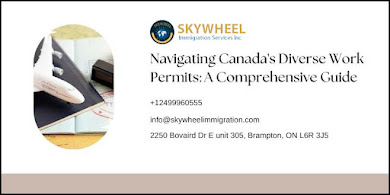Navigating Canada's Diverse Work Permits: A Comprehensive Guide
Individuals in Canada are encouraged and given
several opportunities to financially support themselves and their families. A
valid work permit is required to lawfully work in Canada. To give fair help to
individuals, Canada has a variety of work permits to promote financial
security. Individuals may be eligible for one of the work permit categories
based on their specific circumstances. Skywheel Immigration simplifies the
process, facilitating various Canadian visa types efficiently. From Post graduate work permit
In Canada to skilled worker programs, Skywheel Immigration
ensures comprehensive support for individuals aspiring to relocate to Canada.
This blog will offer an overview of all the
many forms of work permits, categorizing them into sections depending on the
categories and subcategories.
Types of
Canadian Work Visas Available
Almost everybody who wants to work in Canada
must first get a Canada work visa. Canada has primarily two types of work
permits. The two categories of Canadian work visas are as follows:-
Employer-specific
work permit
As the name implies, an Employer-specific work
permit is intended for foreign nationals who will only work for one employer.
This implies that the permit holder must adhere to the terms of their Canada
work visa while working in the nation. The permit normally includes information
on the employer, the place of work, and the length of employment.
Open Work
Permit
This sort of work permit such as a Post Graduate Work Permit in Canada is
more flexible since it permits the bearer to apply and work for any employer.
However, this visa is not suited for everyone and is typically provided to
those who have experienced abuse as defined by the Temporary Foreign Worker
Program of Canada.
Canada grants work permits to a variety of
workers, including temporary, permanent, and company owners. As a result,
Canada's work visa criteria vary based on the type of worker and work permit
needed.
Labor Market
Impact Assessment (LMIA)
An employer in Canada may be required to get
this document before hiring a foreign citizen. This is done from the employer's
perspective. The objective of this document is to indicate that there are no
Canadian workers or permanent residents available to undertake this specific
job, hence the business must recruit a foreign national to fill the position.
The employer must demonstrate and establish that it made reasonable recruitment
efforts for employment in Canada.
A positive LMIA, which is required for ARC applications In Canada,
shows that no Canadian citizens or permanent residents are qualified or
available to fill the vacant post. A negative LMIA indicates that there may be
qualified persons in Canada, and/or that the employer's recruitment efforts
were insufficient. Before hiring a foreign citizen under specific work permits,
the employer must first submit this application and obtain a valid LMIA Work Permit in Canada.
Conclusion
Canada's array of work permits caters to
diverse needs, offering opportunities for temporary, permanent, and
business-oriented workers. Understanding these permits, often linked to ARC
applications for residency, is pivotal. From employer-specific to open permits,
each serves a unique purpose, contributing to Canada's inclusive and supportive
employment landscape.




Comments
Post a Comment